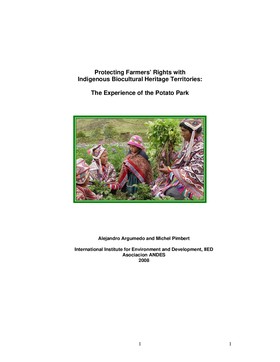Protecting Farmers’ Rights with Indigenous Biocultural Heritage Territories: The Experience of the Potato Park

This paper was prepared for dissemination at the Biodiversity Convention's 9th Conference of the Parties in 2008. ~It argues that the protection of traditional knowledge can only be accomplished by protecting and promoting the complex socio-ecological environment that gives rise to this knowledge. This means protecting the ecological, cultural and territorial integrity of farmers and indigenous peoples. It explores the history and importance of, and threats to, Farmers' Rights; and the use of Indigenous Biocultural Territories (IBCTs) for protection of these rights, drawing on the experience of the Andean Potato Park, Cusco, Peru. It calls on the FAO's International Treaty on Plant Genetic Resources for Food and Agriculture and other international fora - particularly the CBD and WIPO- to consider a sui generis system for protection of traditional knowledge based on IBCTs.
Follow the links below for more about our work on Biocultural heritage.
Cite this publication
Available at https://www.iied.org/g03072